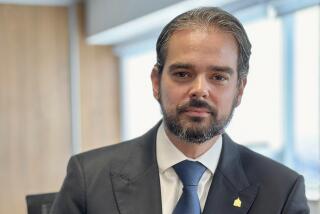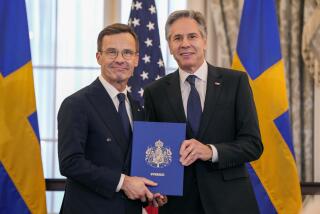U.N. Picks a Chief Iraq Arms Inspector
- Share via
UNITED NATIONS — After rejecting Secretary-General Kofi Annan’s first nomination for a new chief arms inspector for Iraq last week, the Security Council agreed unanimously Wednesday on a new man for the job: Swedish disarmament expert Hans Blix.
Blix, 71, was the director general of the International Atomic Energy Agency from 1981 to 1997 and oversaw inspections of Iraq’s nuclear program with mixed success.
Annan reached Blix by cell phone Wednesday morning in Antarctica, where he is on vacation, to discuss his pending appointment.
“He has already worked in Iraq and has been in the disarmament field for a long time,” Annan said. “He’s a very experienced man, and I’m sure he knows what he’s getting into.”
Blix’s appointment will end a frustrating 40-day search for a chief of the U.N. Monitoring, Verification and Inspection Commission--an agency charged with dismantling Iraq’s weapons of mass destruction. Security Council members failed to agree on Annan’s first candidate--another Swedish diplomat, Rolf Ekeus, who headed the new commission’s predecessor from 1981 to 1997.
The U.S. and Britain endorsed Ekeus, but Russia, France and China said he was unacceptable to Iraq.
Blix was put forward as a compromise candidate by the French one week ago. When envoys asked him to come out of retirement to head one of the most diplomatically and technically difficult assignments at the U.N., Blix was “surprised, reluctant and skeptical,” a diplomat close to the talks said. “He was not enthusiastic about doing it, but he feels it is a duty.”
Diplomats hope that Blix can provide a fresh start for the U.N.’s relations with Iraq, which have been deadlocked since a U.S.-British bombing campaign in December 1998 in retaliation for Baghdad’s blocking of the weapons inspections. Iraq accused the inspection team of harboring spies and has not allowed monitors to return since. Iraq must allow the team to continue inspections, however, before the U.N.’s crippling economic sanctions can be lifted.
“I hope that Iraq will cooperate,” Annan said. “And I think we are going to do everything we can to get them engaged in the game.”
Iraq has praised the work of the IAEA in the past, but Iraqi Ambassador Saeed Hasan said Wednesday: “Devil or angel, the new chairman will not change much in the scheme which has been prepared by the United States. This resolution is not implementable, is not working and will not work.”
While Blix’s experience overseeing nuclear inspections in Iraq and other countries is one of his strongest qualifications, it is also viewed by critics as a strike against him. Despite regular inspections by the IAEA under the Nuclear Nonproliferation Treaty, Iraq was able to develop a comprehensive nuclear weapons program that went completely undetected until after the 1991 Persian Gulf War.
“There is a feeling in the disarmament community that the IAEA didn’t go far enough, wasn’t bold enough or intrusive enough in its inspections,” said Edward C. Luck, a New York University law professor and expert on the U.N. “Blix is very closely identified with the IAEA track record, and so his appointment may be greeted with a bit of skepticism.”
Iraq has grudgingly tolerated routine IAEA nuclear inspections under the nonproliferation treaty--a group completed a check of nuclear materials there Tuesday. The team leader said that Iraq was cooperative and that the inspectors were satisfied that no material had been diverted for military uses.
But since the 1998 bombing campaign, Baghdad hasn’t allowed more detailed and intensive IAEA inspections mandated by the U.N., raising some questions. “There are some outstanding discrepancies that Iraq has yet to resolve,” IAEA spokeswoman Tracy Brown said.
The next step for Blix--after his appointment is formally approved--is to assemble a staff and set up an organizational plan for his inspection team within 45 days. Two months after their arrival in Iraq, they must present Baghdad with a list of disarmament tasks to be fulfilled before sanctions can be suspended.
Although Iraqi leaders have insisted that they won’t cooperate with the U.N. resolution, Western diplomats say Baghdad has folded before under the pressure of a united Security Council.
“The Iraqis understand this resolution. They understand the continuing consequences if they obstruct this process,” said Richard Holbrooke, the U.S. ambassador to the U.N.
“I think they are playing a very dangerous and, ultimately, seriously self-damaging role if they continue to obstruct,” he said. “Let those who saw divisions in the international community note that I am speaking now on behalf of the united, unanimous Security Council.”
More to Read
Sign up for Essential California
The most important California stories and recommendations in your inbox every morning.
You may occasionally receive promotional content from the Los Angeles Times.










